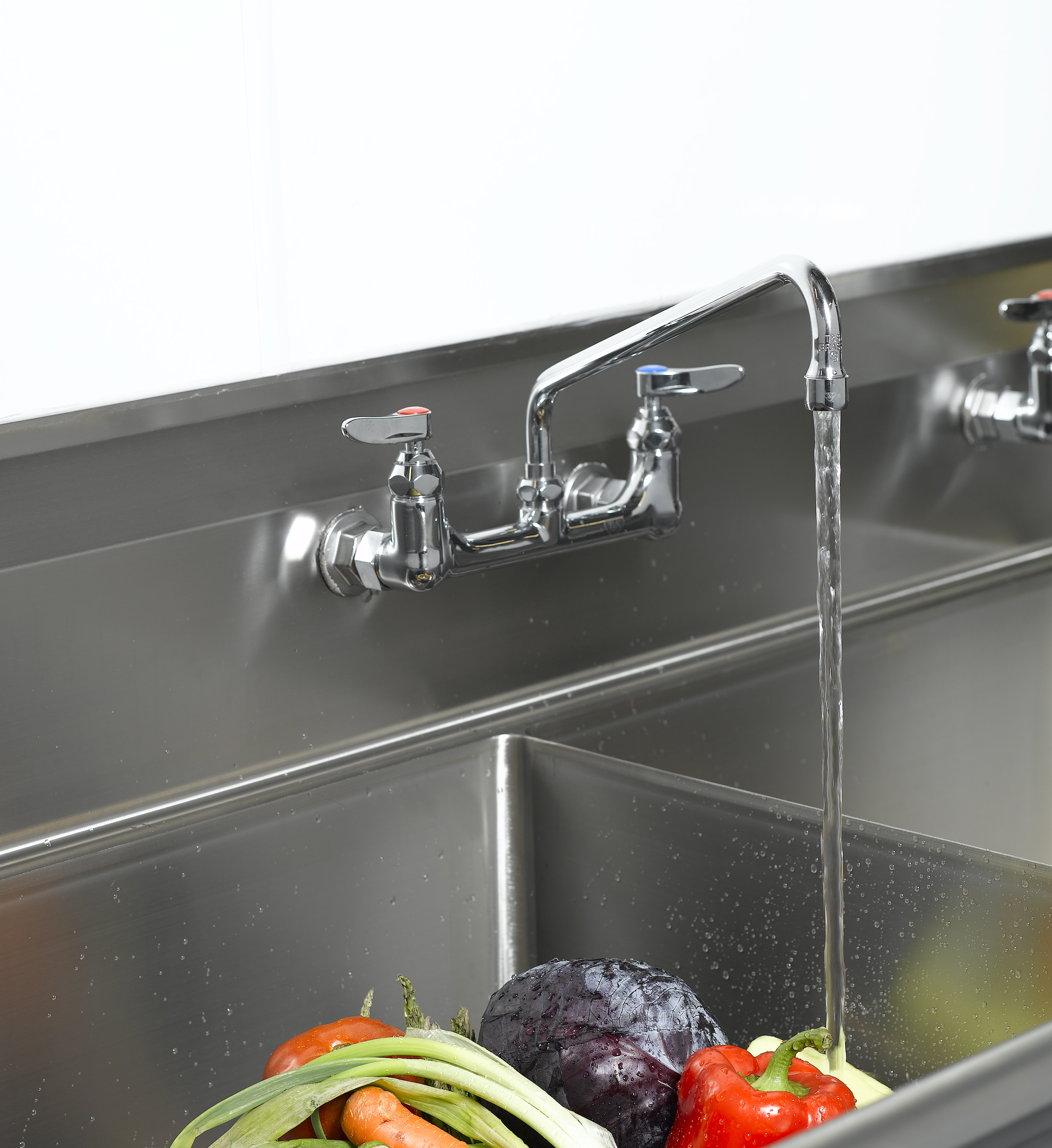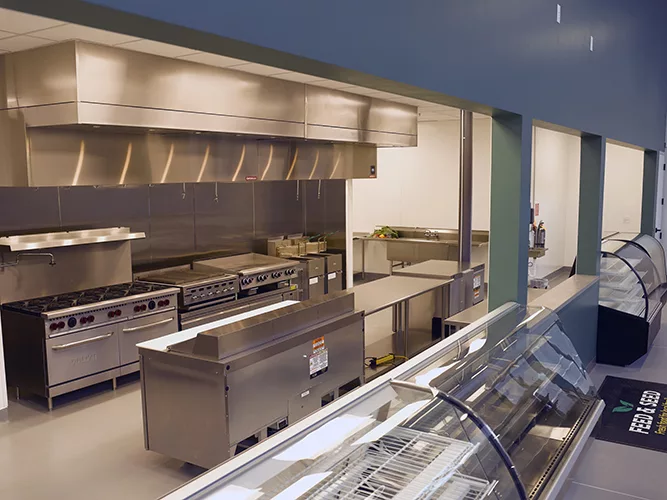Imagine a local and regional food hub that distributes to the community, assists farmers with technical guidance, serves as a hub for collaboration and innovation, and houses a USDA-certified storage facility.
When Mary Hipp dreamed up this solution to make fresh food affordable to South Carolinians, she knew she would need a unique facility to make it a reality.
It took nearly a decade and quite a few obstacles, but the Feed & Seed food hub in Greenville, South Carolina, opened in April 2022.
Hipp, board chair for the Feed & Seed nonprofit, has been a chef and culinary instructor for more than 22 years. She believes local food is one of the most important factors in helping communities grow. “Organic food is great if you can afford it,” she says, “but I believe local food is better in both flavor and nutrition.”
She was passionate about getting local produce into the South Carolina food system and knew a food hub was a necessary addition to the Greenville community. Hipp and her team researched other food hubs for several years and took notes, asking other hubs what they would do differently if they could rebuild. And she integrated her learnings into her evolving plans for the project.
During her research, Hipp discovered that local farmers were also facing tough obstacles. Small farmers cannot compete with mega-farms in terms of both volume and price level, and they can’t rely on farmer’s market booths to make a living.
Additionally, the average age of U.S. farmers continues to rise; education and training are vital to help bolster the younger generation of farmers.
Once Hipp recognized the challenges farmers were facing, she knew she had to get local foods into local hands. “We already have the farmers here, we have the buyers,” she notes. “However, the system that connects the two is broken or just does not exist anymore.”
Hipp decided to rebuild that system, providing a direct connection between farmers and institutions that needed the help, such as local schools, as well as the underprivileged and other residents.
The Feed & Seed team thought it had found its forever home in 2016, but the facility did not end up being a good fit for its needs, so it was back to the drawing board.

Finding a Home at Judson Mill
Judson Mill was built in 1912 and was one of the largest textile mills in Greenville County. In 1933, the mill was sold to Deering-Milliken, and the floor space was expanded. When developers bought the facility in 2018, it needed to be reverted to a state that could receive bid-outs. The developers hired Crenshaw Consulting Engineers in Raleigh, N.C., to revert the facility.
When Crenshaw was first hired, no one knew the Feed & Seed would go in — or even what type of business would take over the space — so it created a completely blank slate for future development.
The developers had a vision for Judson Mill that would honor the spirit of the original space to “connect a diverse mix of neighbors, entrepreneurs, families and businesses.” They wanted to build a community that was sustainable, using existing assets and structures.
Hipp’s vision for the Feed & Seed fit perfectly into plans for Judson Mill, and she finally had a location.
What’s Inside the Feed & Seed
The 18,000-square-foot facility that the Feed & Seed occupies has several different aspects, all requiring different plumbing needs.
Located at the front of the warehouse is a marketplace. Anyone from the community can walk in and buy fresh produce; quick, healthy meals; and other items. Locally grown, seasonal produce such as sweet potatoes, carrots and beans can be found in the marketplace, as well as locally made, organic products such as marinara sauces, peanut butters, and jams and jellies.
Directly behind the market is a commercial kitchen and café, where chefs prepare food for the market with fresh ingredients — and “fresh” means straight out of the dirt. Hipp says she can have a product from a farmer into a distributional market within 48 hours of it being harvested.
The kitchen fuels a café that serves breakfast and lunch, with offerings such as waffles with fresh fruit skewers or buffalo chicken salad wraps.
A second commercial kitchen is focused on research and development. In conjunction with local farmers, the Feed & Seed uses scientific practices to search for new and better ways to preserve food for long-term storage and transport — all without altering chemical structure, flavor and nutrition. The R&D kitchen wants to combat food waste. Instead of discarding end-of-season produce, for example, it turns those items into offerings such as soups or freeze-dried foods.
At the back of the warehouse is 5,200 square feet of USDA-certified space where large pallets of food arrive to be processed and stored.
And, as if all that weren’t enough, some of the storage space is used for a community room, allowing the Feed & Seed team to provide technical support for farmers, community nutritional classes and food safety courses, to name a few.
The Hayne Hipp Community Room is where the Feed & Seed connects farmers with resources to help distribute their crops and provides education on other aspects, such as cleaning and packaging produce.
Specifying Feed & Seed
Although a kitchen equipment engineer typically handles specifying kitchen equipment, Crenshaw had no problem accommodating that request. Mapping out a plan for the front of the facility was fairly straightforward. The back, however, was a different story.
“The commercial processing side was unique to us,” explains Danny Brush, engineer and head of the plumbing department at Crenshaw Consulting Engineers.
The USDA requirements weren’t a hurdle since they closely mirror South Carolina Department of Health and Environmental Control regulations, with which Crenshaw was extremely familiar.
However, the food hub had very specific equipment that required unique specifications.
In the community room, for example, the Feed & Seed needed multi-tiered hydroponic planting displays. Crenshaw specified water connections to the planters that were self-contained, like a fountain.

In the food storage area, Crenshaw needed to specify produce sorter machines that were custom-built by the Amish. “We provided water and drain connections to those, but they were interesting,” Brush notes. The long conveyors have rinse sprays that allow produce to be placed onto one end of the conveyor, and by the time the produce makes it to the end, it is completely clean and rinsed.
Acquiring Plumbing Products
When the project was first conceived in 2016, Hipp and her team reached out to T&S Brass to ask for its assistance with plumbing fixtures. The initial location for the Feed & Seed fell through, and Hipp had little hope that the folks at T&S would still be interested four years later when she found the Judson Mill location. But they “jumped right back in,” Hipp says.
Hipp originally reached out to T&S because it is local to the Greenville community, and she was looking for local partners. T&S also has a reputation for generosity within the community, and Hipp had always been impressed with the quality of T&S products — two additional factors that confirmed her decision.
Crenshaw was familiar with T&S products and had no doubt they would meet the specifications necessary for the Feed & Seed. “T&S is a solid quality product well-suited for commercial kitchen applications,” Brush says.
The T&S experts “walked through the facility and collaborated with us, recommending products that would work best for the task at hand,” Hipp notes. She was impressed that, despite the years passing, the T&S team was still so invested in the project. “You feel like you’re talking to your next-door neighbors, not a big corporation,” she says.
“One product we didn’t even consider was hose reels,” Hipp says. In the USDA section of the facility, Hipp’s team needed to be able to wash all the floors and walls to prevent foodborne illnesses, and T&S included five new hose reel systems to help simplify those efforts.
Making a Difference
Sustainability is a serious focus for Hipp and her team at the Feed & Seed, and T&S’ conservation efforts are another reason that led to her reaching out.
“Low-flow and sensor faucets not only make us more environmentally friendly, but they also help us keep our costs down — an important factor for a nonprofit organization,” explained Hipp.
The full list of T&S products in the Feed & Seed includes gas hoses, handwash stations with sensor faucets, hose reel systems, pantry faucets, portable handwash stations, pot fillers, pre-rinse units and restroom sensor faucets.
Since its opening last April, the Feed & Seed is already integrated into the Greenville community. It offers the community Crop Box subscriptions that include seasonal produce supported by local farmers and other food items made by local food producers at affordable price points.
It has partnered with other local nonprofits to occasionally host free sandwich days for the community.
Feed & Seed’s tagline is “Fresh food for local families, support for local farmers.” They’ve lived up to the lofty goals set by Hipp and her team.
Joan Taylor is the corporate training manager for T&S Brass and Bronze Works. She is passionate about building strong relationships in the commercial plumbing industry by providing educational tools and solutions to customers with unique needs. A certified FCSI education provider, Taylor also develops and implements training curriculums for T&S University.





